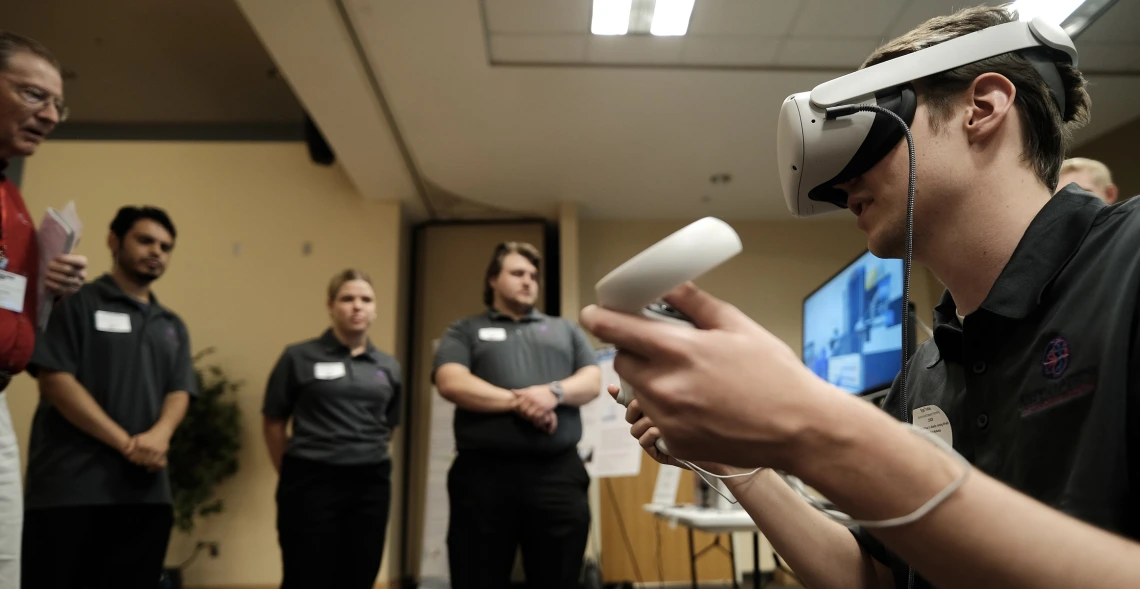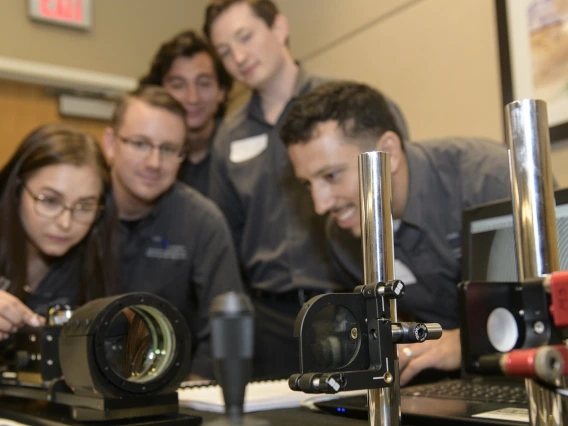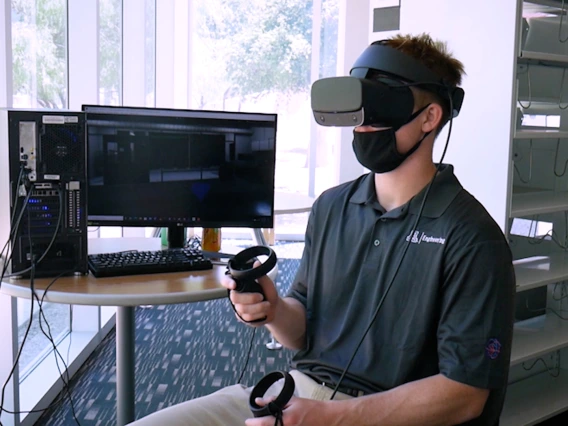Back with a (Flash)bang: Craig M. Berge Engineering Design Day 2022
Engineering students competed for more than $46,000 in prizes at the first in-person Engineering Design Day since 2019, with projects ranging from a battery-powered flashbang alternative to mealworm protein bars.

A team of students demonstrates their virtual reality and opti-robotics project, sponsored by Airy Optics, at Craig M. Berge Design Day 2022. The team won three prizes and took home a total of $4,000.
In an engineering education, students learn to befriend discomfort, whether it comes from eating bugs, facing public speaking or confronting failure.
At the University of Arizona College of Engineering's Craig M. Berge Design Day 2022, students got to celebrate the sense of accomplishment that often comes on the other side of discomfort, as the college celebrated coming together in person after two years of Design Days held virtually due to the pandemic.
Design Day – named for Craig M. Berge, a College of Engineering alumnus and longtime supporter of the college who passed in 2017 – is an annual opportunity for engineering seniors to present the results of their yearlong projects to the public and hundreds of judges. This year, 97 teams of students, who completed projects requested by industry and university sponsors, competed for $46,250 in prizes.
"I talk a lot about grand challenges in society around food and water, energy, health care and security, and what I saw today are a number of great projects that convinced me that we are in good shape, moving forward, to tackle those problems," David W. Hahn, the Craig M. Berge Dean of the College of Engineering, said following Tuesday's Design Day. "When you talk about solving problems, it comes down to one key word: design. Engineers design solutions to problems. Today, we come together to celebrate the culmination of a lot of hard work."
One team – Team 22030 – took home the $7,500 Craig M. Berge Dean's Award for Most Outstanding Project, for their Blinding Resonant Incapacitating Throwable Emitter, or BRITE. Traditional flashbang grenades emit a bright light and loud sound to disorient an assailant, but can also be potentially harmful to the person using it. The team developed a battery-powered, reusable alternative designed to be safe for the user.
The team members created three full prototypes of the device and several dozen prototypes of individual parts. One of the keys to their success, they believe, is that they started early and reiterated often.
"Most of the products sitting on this table did not work," said optical sciences and engineering major Alex St Peter, gesturing to an array of 3D-printed parts. "Did we fail? Totally. But we failed really early, so we were able to correct that."
The students were drawn to the project for its many components, and for its application in fields like defense and law enforcement.
"You could give this to law enforcement and it could be usable. It's something that sparked my eye, and I can see it in the real world," said team lead Jeston Rusnak, a mechanical engineering major. "This is my first time leading a team on a large scale, especially in an engineering capacity. Being surrounded by a bunch of smart people all the time, I have to be on top of my game."
If at First You Don't Succeed...
Another team spent Design Day serving up free samples of protein bars with a special ingredient: mealworms. The idea of eating insects is rising in popularity as some experts project the global population will soon outpace our ability to produce traditional sources of food. Insects require less water, land and food than traditional livestock, and the entirety of an insect can be eaten, compared with 50% or less of an animal like a cow.
"We figured if we put something in a protein bar, it would be more accepted by people, rather than giving them a mealworm steak," said chemical engineering major Collin Patrick Quenelle. "We were able to get 23% of the protein out of the mealworm."
"We only got 4% the first time," added his teammate and fellow chemical engineering major Brett Aiden Cernich, noting the team's progress through the year.
Sustainability was a common theme in this year's Design Day projects. Other teams sought to address global food supply issues with projects related to vertical farming, renewable energy storage and using drones to detect stress levels in crops.
Drones were another popular subject. One team created a low-cost drone tracker that uses visible light to detect drones, which are often too small to show up on radar.
"We learned a lot of stuff that we weren't taught in classes, because they can't teach it in classes, because you have to learn through experience," said electrical and computer engineering team member Brad Zimmermann. "We all, at some point, had to work on something that wasn't our strength."
Sponsors and Judges Recruit Top Talent
Jason Licamele, a discovery and optimization lead at global agriculture company Bayer Crop Science – one of several sponsor companies for Design Day – said about 60% of the employees at Bayer's Marana offices are UArizona graduates. Licamele, who earned a doctorate in agricultural and biosystems engineering from UArizona in 2009, anticipates the company will sponsor more projects in the future.
"We look at the University of Arizona as a place for recruiting talent," said Licamele, who oversaw students' work to create an imaging system to detect crop stress. "They did a great job. And I'm so excited that it's in person again."
Paul Thompson, director of engineering at aerospace company Meggitt Tucson, has attended several Design Days to support Meggitt's interns. This year, he attended as both a judge and a project sponsor for a team that built a tool to apply a heater blanket to lithium battery cells.
"I was extremely impressed with the students' professionalism and presentation skills. I can tell you, I graduated in 2004, and they blew me away," said the aerospace engineering alumnus. "I think the university program is really training these students well for industry."
Students Look Ahead to Bright Futures
Many students learned skills over the course of their projects that set them up for success in their careers. Optical sciences and engineering major Avalon McLeod's team created a hyperspectral camera that won the $1,500 II-VI Aerospace & Defense Award for Best Optical Systems Design. She's heading to NASA's Jet Propulsion Laboratory this summer to work on another hyperspectral camera.
"They were definitely interested in me largely because of this project, including the experience I gained with nanofabrication," she said. "I will use my experience and expertise from this, definitely, in my career."
Biomedical engineering student Clara Mersiowsky said that while she learned a lot through the year, her favorite part of the process was Design Day itself.
"I learned a lot more about materials science. I also learned a lot more about interdisciplinary projects and working with other engineers and applying that," she said. "It is so much fun being able to show people what we've worked so hard on, and to deliver a product to our sponsor."
Brian Faires, an electrical and computer engineering major whose team won the $1,500 Rincon Research Award for Best Presentation and the $1,000 Sharon ONeal Award for Best Integration, Verification and Validation for their project to create an electronic continuously variable transmission, echoed the sentiment: "There's nothing like getting to drive with a transmission you built."
View the Design Day booklet and project videos.
Craig M. Berge Design Day 2022 Winners
Craig M. Berge Dean’s Award for Most Outstanding Project – $7,500
Team 22030: BRITE: Blinding Resonant Incapacitating Throwable Emitter
Nathan Busack, Chase Alexander Musick, Jeston Rusnak, Alex St Peter, Ryan Paul Stancliffe, Nathan Verdonk
Project Sponsor: Elbit Systems
Raytheon Award for Best Overall Design - $5,000
Team 22010: Microsoft Slide Cleaning System
Dayton F Brown, Melanie Grudinschi, Karen A Huppenthal, Elijah James Keeswood, Richard Lu
Project Sponsor: Roche Tissue Diagnostics
Bly Family Award for Innovation in Energy Production, Supply or Use (First Prize) – $2,000
Team 22057: Windmill Conversion
Michael Debbins, Shane Lawler, Justin Schoentag, Michael Whitley, Caleb Yoshiyama
Project Sponsor: Tucson Village Farm, Sponsored by the Craig M. Berge Community Project Fund
Bly Family Award for Innovation in Energy Production, Supply or Use (Second Prize) – $1,000
Team 22077: Sustainable Lithium Production
Tyler J Bailey, Ascii DeLeon Magno, Ahmad Kh A A H Mohammad, Aloysia J Wine
Project Sponsor: UA Department of Chemical and Environmental Engineering
RBC Sargent Aerospace & Design Voltaire Design Award – $2,500
Team 22017: Launch Vehicle Front End Cover and Retraction System
Raquelle Denetso, James Patrick Guinan, Wyatt M Hansen, Davis James Payton, Lindsey Williams, Brendan Yip
Project Sponsor: Northrop Grumman
UA Mentor: Pat Caldwell
ACSS, an L3 Harris and Thales Joint Venture Award for Most Robust Systems Engineering - $2,500
Team 22028: Connecting Virtual to Reality: Joining VR With Complex Opti-Robotics
Tyler Collins, Gerardo Garcia, Jace Malm, Ariel Shaver, Arielle Christine Stanley, Ryan Thurber
Project Sponsor: Airy Optics
Ball Aerospace Award for Best System Software Design – $2,500
Team 22025: Voice Recognition System With Direction, Translation and Display
Rayan Alzayer, Jason Heiman, Kale E Henning, Wenkai Jiang, Natalie Scott
Project Sponsor: McDonald/Watt Projects
Roche Tissue Diagnostics Award for Most Innovative Engineering Design - $1,500
Team 22071: The Mobile Vertical Farm (or Go-Vertical Farm) for Automation of Vertical Farming Operations
Daniel Fernandez, Joseph Andrew Green, Christopher John Kaufmann, Tom Maillard, Tristan Martin, Diego Moscoso, Byron Snead
Project Sponsor: UA Department of Biosystems Engineering
Andressen Award for Design Above and Beyond – $1,500
Team 22054: REDIEM: Renal Extremity Device to Measure Impedance, Edema and Movement
Spencer Ciammitti, Emmanuel Enriquez, Diana Meyer, Jocelyn Reynolds, Madelyn Reynolds, Julia Starkey
Project Sponsor: Kidney ADVANCE Project - NIH/ACABI
Rincon Research Award for Best Presentation – $1,500
Team 22018: Electronic Continuously Variable Transmission
Lance P Casto, Lucas Cougar Creery, Eric Anthony Duarte, Brian Faires, Andre Schreiber, Micah Sieglaff
Project Sponsor: UA Department of Electrical and Computer Engineering
II-VI Aerospace & Defense Award for Best Optical Systems Design - $1,500
Team 22044: Hyperspectral Camera
Sehrish Choudhary, Parker Dattilo, Allie Harkins, Avalon McLeod, Kevin Meyer
Project Sponsor: Raytheon Technologies
Gore and Associates Award for Lifelong Innovation - $1,250
Team 22032: MIS Flatfoot Reconstruction
Makenna Noel Aitken, Mansour Albayyat, Tai Combs, Brandon Martin, Deip Sekhadia
Project Sponsor: Paragon 28
W.L. Frank Broyles Award for Best Unmanned Aircraft Systems Design (First Prize) – $1,000
Team 22023: DF North Offset Drone Test Module (NODTM)
Isela Burruel, Dylan Campbell, Charlie Charpentier, Osvaldo Estrella, Spencer Joshua Scher
Project Sponsor: General Dynamics
W.L. Frank Broyles Award for Best Unmanned Aircraft Systems Design (Second Prize) – $250
Team 22026: A Real-Time Vegetation Stress Detection System on a Drone
Mashari Alkhamisi, Haley Boyd, Matthew Phillip Wolfgang Hevert, Caiyue Lai, Edward Zhu
Project Sponsor: UA Department of Biosystems Engineering
Steve Larimore Award for Perseverance and Recovery - $1,000
Team 22021: Optimal Valve Diaphragm and Membrane Design for Use in Medical Catheters
Colette Doerr, Kelsi Petrillo, Sydney Schreiner, Mansi Singh, Max Tucker
Project Sponsor: Xeridiem Medical Devices
Honeywell Award for Excellence in Aerospace Mechanical System Design - $1,000
Team 22045: Airfoil Cascade Hub Injection
Adrian Brelay, Hector Ibarra, Nicolas Kapler, Carlos Pelayo, Adan Ramirez Lemus
Project Sponsor: Honeywell Aerospace
Honeywell Award for Excellence in Aerospace Electronic System Design – $1,000
Team 22072: Intelligent Aeroponic Microgravity & Earth Nutrient Delivery (I-AMEND) System for Bioregenerative Space Life Support and Earth Applications
Madison Baity, Julia English, Sydney Harrison, Karen Perkins, Justus Tiffany
Project Sponsor: UA Department of Biosystems Engineering
Garmin Award for Best Use of Wireless Technology – $1,000
Team 22069: Smart Rocks – a Network of Covert Smart Sensors (Joint UArizona-UMass Lowell Project)
Jesus Lopez, Brianna Robles, Nicole Isabel Statler, Martin Vazquez, Chris K Vuong
Project Sponsor: Raytheon Technologies
The Mensch Foundation Award for Best Use of Embedded Intelligence – $1,000
Team 22026: A Real-Time Vegetation Stress Detection on a Drone
Mashari Alkhamisi, Haley Boyd, Matthew Phillip Wolfgang Hevert, Caiyue Lai, Edward Zhu
Project Sponsor: UA Department of Biosystems Engineering
Sharon ONeal Award for Best Integration, Verification and Validation – $1,000
Team 22018: Electronic Continuously Variable Transmission
Lance P Casto, Lucas Cougar Creery, Eric Anthony Duarte, Brian Faires, Andre Schreiber, Micah Sieglaff
Project Sponsor: UArizona Department of Electrical and Computer Engineering
TRAX International Award for Best Implementation of Agile Methodology – $1,000
Team 22026: A Real-Time Vegetation Stress Detection on a Drone
Mashari Alkhamisi, Haley Boyd, Matthew Phillip Wolfgang Hevert, Caiyue Lai, Edward Zhu
Project Sponsor: UA Department of Biosystems Engineering
Technical Documentation Consultants of Arizona Award for Best Design Documentation – $1,000
Team 22028: Connecting Virtual to Reality: Joining VR With Complex Opti-Robotics
Tyler Collins, Gerardo Garcia, Jace Malm, Ariel Shaver, Arielle Christine Stanley, Ryan Thurber
Project Sponsor: Airy Optics
Mark Brazier Award for Best Biomedical System Design – $1,000
Team 22049: K - Dx - A Point-of-Care Potassium Diagnostic System
Prabhkirat Bindra, Reid Loeffler, Julia McElwee, Teresa Thuytien Pham, Vanessa Danielle Silbar
Sponsor: Kidney ADVANCE Project – NIH/ACABI
II-VI Aerospace & Defense Fish Out of Water Award – $750
Spencer Ciammitti (Team 22054: REDIEM: Renal Extremity Device to Measure Impedance, Edema and Movement)
Phoenix Analysis & Design Technologies (PADT) Award for Best Use of Prototyping – $750
Team 22006: Slide Label Applicator for Simplified Handling
Mohammad Ahmad Al-Yaqoub, Cole Daniel Carrigan, Sarah Alison Gilliam, Xylia Amairani Marquez Garcia, Randi Nicole Shaeffer, Aaron T. Winkle
Sponsor: Roche Tissue Diagnostics
SciTech Institute Award for Best Engineering Analysis – $750
Team 22091: Hydro-Desulfurization Unit
Paul Satoshi Haynes, Ian Hitner, Marc Manye Ibanez, Victor Vargas
Project Sponsor: UA Department of Chemical and Environmental Engineering
AZ Technica Award for Sustainable Manufacturing Innovation – $500
Team 22077: Sustainable Lithium Production
Tyler J Bailey, Ascii DeLeon Magno, Ahmad Kh A A H Mohammad, Aloysia J Wine
Project Sponsor: UA Department of Chemical and Environmental Engineering
AZ Technica Award for Manufacturing Readiness – $500
Team 22030: BRITE: Blinding Resonant Incapacitating Throwable Emitter
Nathan Busack, Chase Alexander Musick, Jeston Rusnak, Alex St Peter, Ryan Paul Stancliffe, Nathan Verdonk
Ergo Dave Award for Best Use of Human Factors Engineering – $500
Team 22013: Improved De-Cluttering of Aircraft Cockpit Traffic Displays
Cameron Fernandez, Rosemary J Kingsley, Alexis Lerwill, Tj Markandeya, Christiana Grace Williamson
Project Sponsor: L3 Harris Commercial Aviation
Simpson Family Award for Best Simulation and Modeling – $500
Team 22028: Connecting Virtual to Reality: Joining VR With Complex Opti-Robotics
Tyler Collins, Gerardo Garcia, Jace Malm, Ariel Shaver, Arielle Christine Stanley, Ryan Thurber
Project Sponsor: Airy Optics
L3 Latitude Engineering Award for Best Physical Implementation of Analytically Driven Design – $500
Team 22024: Gas Pycnometer for Determining the Density and Porosity of Returned Asteroid Bennu Samples
Parrish Cole Halbert Ballenger, Bryce Robert Flickner, Jose Antonio Ortiz, Olivia Requist, Joshua Richards
Project Sponsor: UA Lunar & Planetary Laboratory
Dataforth Corporation Award for Best Design Using a Data Acquisition and Control System – $500
Team 22048: CytoMech – Microfluidic System for Determination of Cell (Platelet) Stiffness
Jacob Baker, A’Niah Bell, Taliah Gorman, Celyn Jacobs, Michael Osipov
Project Sponsor: ACABI, supported by the Craig M. Berge Design Program
Honeywell Award for Team Leadership – $250 per awardee
Jeffrey Northcutt (Team 22095: Long-Term Surveillance via Solar-Powered UAV)
Deip Sekhadia (Team 22032: MIS Flatfoot Reconstruction)



